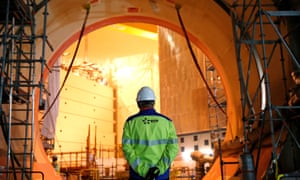
The company building the UK’s first new nuclear power station for decades is facing questions over the health of its fleet of French nuclear plants after an investigation which has left the country with the lowest level of nuclear power for 10 years and the prospect of power cuts during a cold snap.
Thirteen of Électricité de France’s (EDF) 58 atomic plants are offline, some due to planned maintenance, but most for safety checks ordered by the regulator over anomalies discovered in reactor parts.
The outages have prompted warnings of potential planned power cuts and pushed up wholesale power prices, boosting coal and gas operators but squeezing small energy suppliers. Carbon emissions will possibly rise too as France, which last year forged a historic climate change deal in Paris, has to import more fossil fuel power.
The problems stem from a fault identified last year by the Nuclear Safety Authority (ASN) in the as-yet-unfinished reactor at north-western France’s Flamanville plant – the same design approved for Hinkley Point C in the UK.
Pierre-Franck Chevet, president of the ASN, told Le Figaro the situation was “very worrying” and the discovery had led to “unprecedented” checks at all the country’s nuclear plants, which provide 75% of France’s electricity and normally help it export power to other countries. The issue is higher than expected carbon concentrations in steel reactor components, which could make them vulnerable to cracking.
EDF insist its French fleet, much of which dates back to the 1980s, is safe and that its reactors will start coming back online within weeks.
And while experts do not expect the episode to result in a big financial hit to EDF, they believe it could turn up the pressure on a company which is already stretched.
“The longer than expected outages at some of EDF’s nuclear plants place additional pressure on the company at a time that it is already under significant financial stress,” said Jim Watson, research director at the UK Energy Research Centre. “It has already taken a big risk in pursuing the Hinkley C project in the UK because other reactors using that design [in Finland and France] have suffered from delays and large cost overruns.”
Peter Atherton, associate at analysts Cornwall Energy, said the failure of earlier inspections to pick up on problems was “a very serious thing, a bit of a stain on the whole French programme”.
A spokesman for EDF – which has already cut its nuclear electricity output target and its profits expectations for this year – said the company was confident the reactors would reopen by the end of December. “Safety is our top priority,” he said. “EDF as operator is responsible for nuclear safety, and we have the presence of an independent and strong safety authority (ASN).”
But the most immediate concern is the possibility of power cuts in the world’s fifth biggest economy.
French grid operator RTE said the low nuclear output and France’s unusually high reliance on electric heating meant a cold snap could result in “exceptional measures”. Those include lowering the voltage and, as a last resort, rolling power cuts around the country for two hours or so at a time.
The outages have also pushed up European wholesale power prices. Henry Edwardes-Evans, an energy trading expert at Platts Power in Europe, said the reduced nuclear output and rising coal costs over the summer had been a “double whammy” that has driven up wholesale prices, which have been low in recent years.
The higher wholesale prices have also caused problems for smaller energy suppliers. “The nuclear outages played a significant role in GB Energy going bust,” said Atherton, referring to the three-year-old UK supplier with 160,000 customers which ceased trading last weekend, blaming “swift and significant increases in energy prices”.
Nuclear critics believe the situation shows the need for France to diversify away from nuclear and invest more in renewable sources such as wind and solar power, which account for less than 4% of electricity generation, compared with 25% in the UK.
Charlotte Mijeon, of the anti-nuclear group Sortir du Nucléaire (Get Out of Nuclear), said there was a “chain of responsibility” for the crisis in France’s nuclear industry which ranged from the government at the top to subcontracted private suppliers.
“The system of nuclear safety in France has always been limited,” she said. “It starts from the premise that the industrials are honest and the moment there is a problem they will flag it up to the safety authorities and it will be sorted out.”
